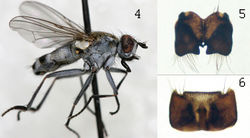Difference between revisions of "Lispe microptera"
m (Imported from ZooKeys) |
m (1 revision) |
(No difference)
| |
Latest revision as of 15:07, 31 October 2012
| Notice: | This page is derived from the original publication listed below, whose author(s) should always be credited. Further contributors may edit and improve the content of this page and, consequently, need to be credited as well (see page history). Any assessment of factual correctness requires a careful review of the original article as well as of subsequent contributions.
If you are uncertain whether your planned contribution is correct or not, we suggest that you use the associated discussion page instead of editing the page directly. This page should be cited as follows (rationale):
Citation formats to copy and paste
BibTeX: @article{Vikhrev2012ZooKeys235, RIS/ Endnote: TY - JOUR Wikipedia/ Citizendium: <ref name="Vikhrev2012ZooKeys235">{{Citation See also the citation download page at the journal. |
Ordo: Diptera
Familia: Muscidae
Genus: Lispe
Name
Lispe microptera Séguy, 1937 – Wikispecies link – Pensoft Profile
Material examined
India: Rajasthan state: Jaipur, 26.96°N, 75.85°E, 21–22.II.2011, NV, 10♂♂, 7♀♀; Sambhar salt-lake, 26.916°N, 75.190°E, 23.II.2011, NV, 8♂♂.
Distribution
India, Rajasthan and Pakistan, Karachi (type locality).
Description of female
Body length 7–7.5 mm, wing length 6mm.
Frontal triangle narrow, yellowish dusted; interfrontalia brownish-black. Fronto-orbital plate blackish grey dusted, with 4 inclinate and 2 proclinate setae and dense hairs in outer row. Parafacial covered with hairs. Antenna black, postpedicel short. Arista with hairs two times shorter than antenna width, in apical third bare. Palpus narrow, dirty-yellow.
Thorax. Scutum and scutellum brownish dusted with a pair of indistinct vittae, pleura grey dusted.
dc 2+4 (medium - medium + medium/weak-medium/weak-strong-strong). Meron with 3-4 setulae above hind coxa, anepimerom with about 15 setulae. Wing with vein R4+5 distinctly curved forward.
Legs. Femora dark with yellow apex, tibiae yellow in basal half and dark in apical half, tarsi black.
f1 with a complete row of 10-12 pv setae. t1 with submedian p seta. f2 with a row of short a setae in basal half and with 2 pd at apex. t2 with 1 submedian p seta. f3 slightly curved; with a short av seta at basal 1/3 (absent in some specimens) and short pv at apex, av preapical absent. t3 with 1 ad and 1 pd setae at middle. Hind tarsus unmodified.
Abdomen grey dusted with large dorsal black spots separated by anteriorly interrupted grey vitta.
Male differs from female as follows: body length 6.5-7 mm, wing length 5-5.5 mm; f2 with a complete row of fine v setae about as long as femur width; f3 in basal half with 4–5 fine long (2–2.5 femur width) pv setae and 1(2) av in basal 1/3; hind tarsus modified: tar3-1 slightly laterally compressed and outward curved, with waved ventral setulae more dense at base and at apex; tar3-2 with waved ventral setulae; male cercal plate as in Fig. 8.
Taxon Treatment
- Vikhrev, N; 2012: Revision of the Lispe longicollis-group (Diptera, Muscidae) ZooKeys, 235: 23-39. doi
Images
|

